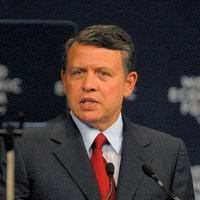AMMAN, Jordan -- Two years after the start of the Arab Spring, Jordan’s King Abdullah II has launched what he says is a third way. His approach, the king maintains, will bring peaceful democratic change, empowering the people and modernizing the country, while averting chaos and preventing extremist parties from emerging victorious. It’s a tall order, and one that has met with doubt among many skeptics and critics.
So far, the Arab uprisings have given people of all political persuasions a reason to feel anxious. Arab liberals have not made any significant gains. Islamist groups, the principal winners until now, are struggling, and monarchies are still on their guard, hoping they can avert the disaster that befell other non-elected regimes in the region. Abdullah’s approach, if successful, could provide a template for change.
The fate of Jordan is of utmost concern to the West, Israel and many in the Arab world, particularly other monarchs. Washington hopes the king will succeed because Jordan is America’s top Arab ally, pivotal on a number of important strategic matters, including the continuing unraveling of nearby Syria. Israel, too, is watching closely. Jordan is one of two Arab countries officially at peace with the Jewish state, and is a key player in the Israeli-Palestinian conflict. Along the Persian Gulf, Arab kings and emirs, who helped King Abdullah fend off what looked like the start of an Arab Spring uprising, fear that if the Hashemite king loses power in Jordan, it will trigger a new wave of uprisings that might sweep them out as well.

